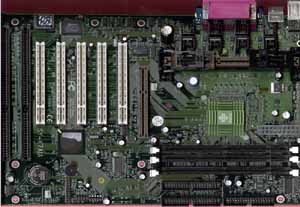Soyo SY-K7AIA AMD 750 ATX Slot-A
by Anand Lal Shimpi on March 3, 2000 1:08 AM EST- Posted in
- Motherboards
Just a year ago, the most highly anticipated chipset release was the i820 with the majority of hardware enthusiasts interested in exactly how they could replace their somewhat aging BX setups. It's amazing how things have changed so quickly since today, just about any CPU related poll run on AnandTech results in a 70% favoring of AMD over Intel and with that comes a demand for more AMD platform motherboards, in particular, Athlon motherboards.
Even towards the end of last year, there were only a handful of Athlon motherboards on the market, but now things have changed considerably. Producing and promoting everything but i820 motherboards seems to be the trend right now, and as we saw from our CeBIT 2000 coverage, the support for the Athlon platform from motherboard manufacturers has increased dramatically.
Among the companies jumping on the Athlon bandwagon is Soyo, often considered to be a very close competitor to ABIT because of their similar overclocking features. As a company, Soyo has been around for almost 15 years now but just recently have they become known among hardware enthusiasts online. Their motherboards have been generally well accepted and have been able to stand out among the competition in this overpopulated market.
One section of the motherboard market that is far from overpopulated is the Slot-A Athlon faction, and this happens to be the same area that Soyo's latest board, the K7AIA is targeted at. The Athlon is a serious contender in the desktop x86 CPU market and with that title comes the need for high quality motherboards to support the platform. In an attempt to get their foot in the Slot-A doorway Soyo's K7AIA brings to the table little more than basic functionality as an Athlon motherboard.
|
Motherboard Specifications |
|
| CPU Interface |
Slot-A
|
| Chipset |
AMD 750
AMD 751 North Bridge AMD 756 South Bridge |
| L2 Cache |
N/A (on-chip)
|
| Form Factor |
ATX
|
| Bus Speeds |
100MHz
|
| Voltages Supported |
Auto Detect (1.35v - 2.80v)
|
| Memory Slots |
3 168-pin DIMM Slots
|
| Expansion Slots |
0 AMR Slot
1 AGP Slot 5 PCI Slots (3 Full Length) 2 ISA Slots (1 Shared / 2 Full Length) |
| AC'97 |
N/A
|
| BIOS |
AWARD v6.00PG
|
The Good
With KX133 motherboards just starting to hit the streets (i.e. EPoX 7KXA, ASUS K7V, K7V-RM), it may seem pointless for Soyo to release a motherboard based on the older AMD 750 chipset. Unfortunately, because of the lead time associated with producing a new motherboard design, Soyo was left with the option of releasing an Athlon board now based on the older 750 chipset or waiting another couple of months and releasing their first Athlon motherboard then. From a marketing standpoint, it's better for Soyo to go ahead and push for the release of an Athlon motherboard now, even if it's not on the bleeding edge in terms of features or even the chipset it's based on.
The K7AIA is a true AMD 750 based solution in that it makes use of AMD manufactured North and South bridges, more specifically the 751 North Bridge and the 756 South Bridge. The AMD 751 North Bridge supports AGP 2X, the 100MHz DDR FSB frequency of the Athlon, and PC100 SDRAM support. The AMD 756 South Bridge rounds off the feature set by adding support for Ultra ATA 33/66 devices on the two integrated IDE channels. In contrast, the newer KX133 chipset on the EPoX 7KXA offers PC133 memory and AGP 4X support as the main two advantages over the AMD 750 chipset. For more information about the KX133 chipset and its advantages over the AMD 750, take a look at our review of the VIA Apollo KX133 chipset.
The first thing we noticed about the K7AIA upon its arrival in the AnandTech lab was that it very closely resembled the AMD Fester reference board design. It quickly joined the ranks of Gigabyte and Microstar as having boards that closely resemble AMD's Fester. This isn't necessarily a bad thing, since the Fester is actually a very reliable Athlon motherboard, unfortunately it was never meant nor will ever be available for public sale. The Fester reference design from AMD set the guidelines that motherboard manufacturers should follow while producing 6-layer, AMD 750 based, ATX Slot-A Athlon motherboards.











0 Comments
View All Comments